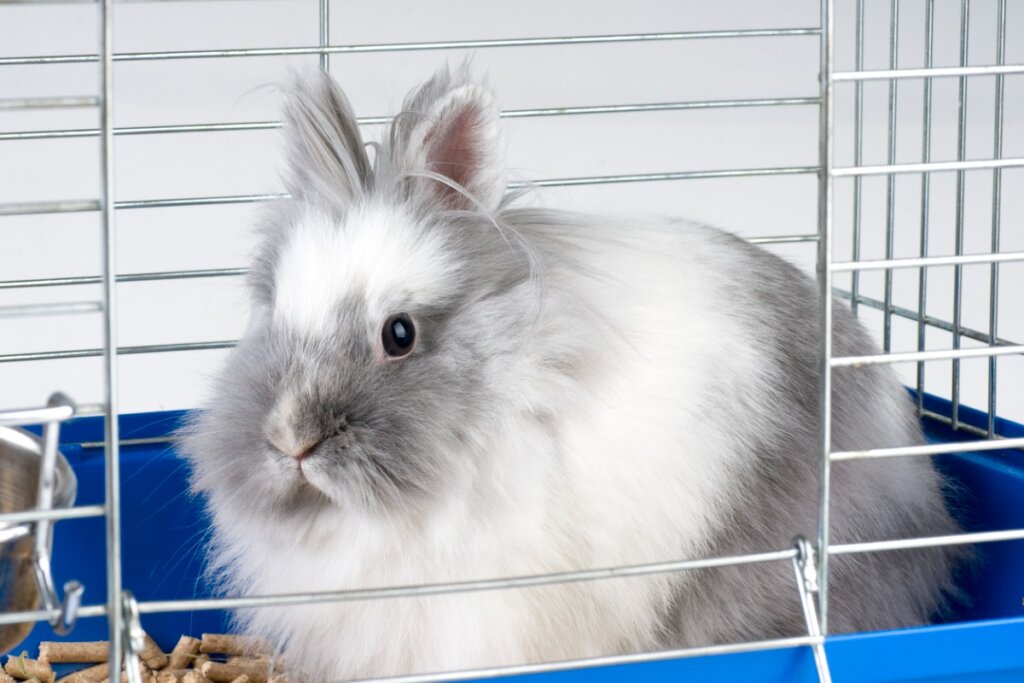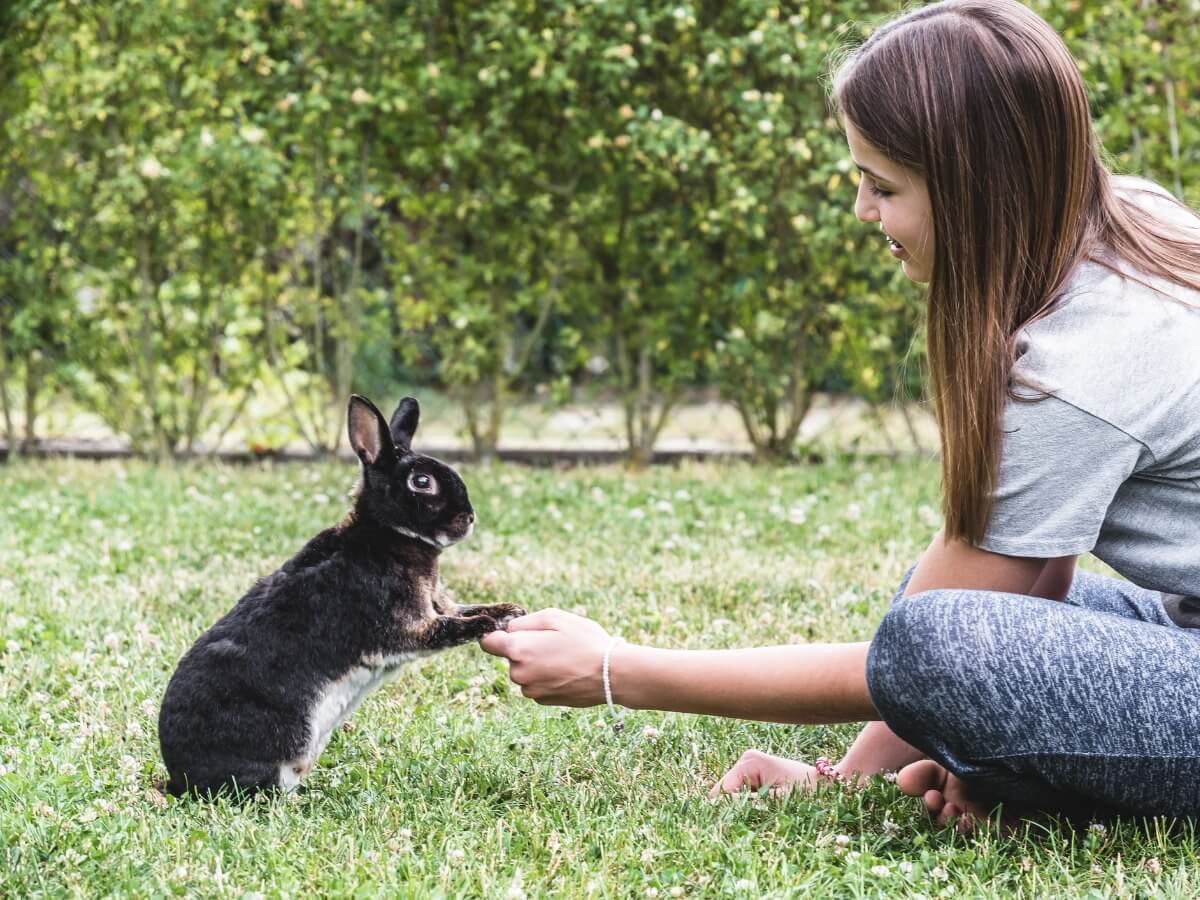Why Does My Rabbit Bite its Cage?

You know it’s not going to get to gnaw on that bar until it breaks it and your rabbit probably knows that too! So why does your rabbit bite its cage? The noise can be incessant and they sometimes even scratch the bars, something that can become very annoying for the owner.
In order to ensure that this behavior doesn’t unsettle either of you (or harm your rabbit’s dental health), we’ve prepared this article for you to find the main reasons why your rabbit bites its cage. To correct it, you need to be able to find out the cause.
Reasons why your rabbit bites its cage
To get attention
Rabbits are gregarious animals that will demand your attention on a daily basis. If you pass by its cage and it wants to come out to greet you or be with you, then your pet will bite the bars to make you listen to it.
It’s also possible that they’re trying to get your attention because some of their needs aren’t being met. Make sure the rabbit always has hay available and fresh water to drink.

The rabbit bites the cage because of nervous energy
Rabbits, especially at dusk and in the evening, are active animals that must discharge the energy they have accumulated by sleeping during the day. So, when they have no way of exercising or amusing themselves, rabbits can bite their cage because of their own nervous energy.
Due to boredom
These lagomorphs are intelligent animals, accustomed to social interaction with their fellow rabbits and to amusing themselves, usually looking for food. If the environmental enrichment in its cage isn’t enough, then the rabbit will bite the bars as a form of entertainment!
Due to stress
In a house environment, there can be many stressors for a rabbit: a lack of space, a lack of enrichment, loud noises, pain, the presence of predators (such as dogs), or even a poor diet. The simple act of gnawing and chewing helps to relieve tension, and what these animals tend to have closest to hand in the home are the bars of their cage.
Because they want to go out
Rabbits need to exercise. An animal that lives by moving all day in search of food can’t be locked up in a cage 24 hours a day. This is probably not an adequate shelter for them and they’ll try to find another place to rest and shelter.
Because it’s part of their behavior
Nibbling and gnawing is an essential part of the rabbit’s natural behavior. Their molars and incisors are continuously growing, so they must wear them out throughout their lives. Even if the animal has a happy and fulfilling life, this instinct can’t be eliminated. The only thing you can do is redirect it towards safe objects, such as toys.
Rabbit tooth growth is constant, which is why they take almost everything they can to their mouths.
How much space does my rabbit need?
Ideally, a rabbit shouldn’t live in a cage and should be free to roam around the house, as long as the place is enabled for it and there are no predators inside the home or in its vicinity. If you can also provide a safe outdoor space for the animal, it’ll be able to adapt perfectly to life with humans.
However, leaving rabbits loose and unsupervised and without a safe area can lead to disaster. To do this, it’s best to remove them daily from their cage and place them in a specially-prepared enclosure and progressively lengthen the time they spend in it as they learn their limits and adapt to the home.
Why does my rabbit bite a wooden cage?
In rabbits that live in wooden cages, it’s common to see how they end up destroying it and even trying to eat it. This can be due to many reasons, from a lack of vitamins to reaching reproductive age.
The only way to prevent it is to keep the cage in adequate hygienic conditions, and provide enough hay, fresh water, and enrichment in a safe, quiet environment. If the problem persists, a visit to the vet can rule out potential nutritional deficits and other illnesses in the troubled rabbit.
How to prevent my rabbit from biting the cage?
As mentioned above, this is a very basic instinct linked to the rabbit’s dental and digestive health, so it shouldn’t be suppressed. Some tips we can give you are the following:
- If your rabbit still needs a cage, make sure it’s wide enough to accommodate a feeding space, a litter box for his needs, shelter, and extra space for it to move, turn, and stand.
- Take care of its diet: Dental overgrowths and other oral problems in rabbits, in addition to being a threat to their life and very difficult to control, will cause the animal to bite the cage due to discomfort. This is prevented with quality hay and specialized feed, as well as a daily ration of fresh leaves.
- Provide enough entertainment: If you teach the rabbit that it should gnaw the toys that you’ve prepared for it, then you’ll both win! In addition, in this way you prevent behavioral and mental disorders in the pet.
- Clean their space daily: Lagomorphs are very clean animals and are uncomfortable if their resting area is dirty.
Lastly, pay attention to your pet. As with any exotic animal, their behavior may be somewhat indecipherable at first, but, over time, you’ll become best friends if you spend time working on your relationship with your rabbit.
All cited sources were thoroughly reviewed by our team to ensure their quality, reliability, currency, and validity. The bibliography of this article was considered reliable and of academic or scientific accuracy.
- Fernández-Cid, J. V. G. (2011). Patologia de lamomorfos y roedores. Revista Complutense de Ciencias Veterinarias, 5(2), 63.
- Ruiz, M. Guía básica del cuidado del conejo.
- Capello, V., & Gracis, M. (2005). Rabbit and rodent dentistry. Lake Worth: Zoological Education Network.
- Bourne, D. (2012). Hay for a healthy rabbit: the importance of appropriate feed. The Veterinary Nurse, 3(3), 154-162.